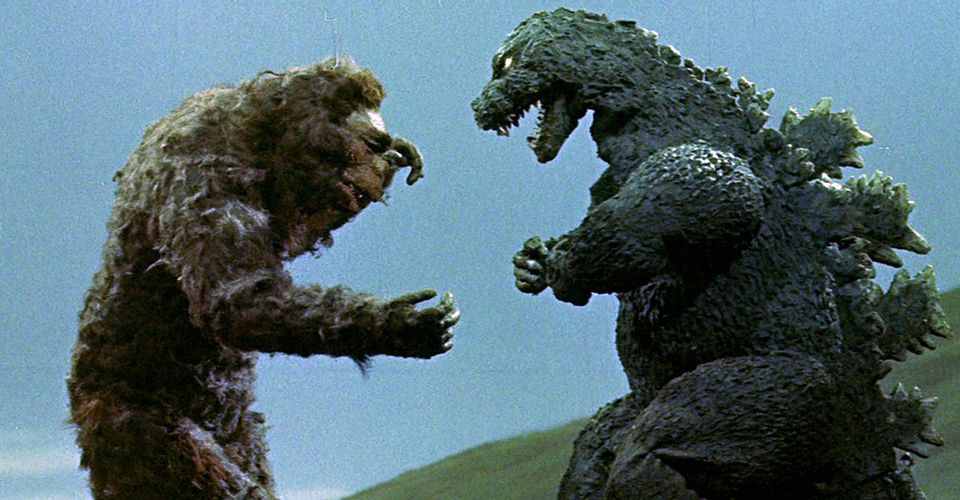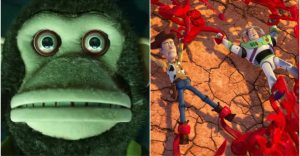King Kong Vs Godzilla Alternate Ending Myth Explained & Debunked

2021 blockbuster Godzilla vs. Kong won’t be the first time they’ve faced off, but the 1962 King Kong vs. Godzilla movie has a disputed ending. In less than two months, Godzilla vs. Kong will release, both in theaters willing to show it at this stage of the Coronavirus pandemic, and streaming on HBO Max. The idea of watching such a titanic battle take place for the first time on a TV seems a bit weird, but better to be safe than risk getting sick.
Godzilla vs. Kong will be the culmination of the MonsterVerse so far, following Godzilla, Kong: Skull Island, and Godzilla: King of the Monsters. It may just be a battle for the ages, but it won’t be the first encounter between the two gargantuan behemoths. In 1962, Godzilla’s home company Toho Studios produced King Kong vs. Godzilla, which featured the two monsters going head to head, albeit with Kong now being the same size as Godzilla. That tactic is understandably being used again this year to create a more even match.
There’s a lot of room for improvement in the new Godzilla vs. Kong, thanks to the massive leaps special effects have taken since 1962. This time it won’t be two suit performers fighting, as charming as that can be to watch. Still, the older film is fondly remembered by many, and an urban legend concerning its ending has persisted for decades, even in the information age. It’s a compelling idea, which asserts that there are two different cuts of the film, one in which Kong wins, and one in which Godzilla wins. However, that just isn’t true.
King Kong vs. Godzilla Has Two Different Cuts

As mentioned previously, King Kong vs. Godzilla was a Toho Studios production, and was made first and foremost for a Japanese audience. It was released on August 11, 1962 in Japan. However, the film was actually based on a script called King Kong vs. Prometheus by American writer George Worthing Yates, who was hired by producer John Beck. Beck sold the script to Toho, who changed the Frankenstein’s Monster-esque Prometheus character into Godzilla, but Beck retained the rights to make a version of the film for American moviegoers. This cut was released in the U.S. on June 26, 1963, distributed by Universal Pictures.
As was done when bringing the original 1954 Godzilla film stateside, the English-language cut of King Kong vs. Godzilla was quite heavily altered, with many scenes edited out entirely, new English-speaking American characters and newly shot scenes inserted into the narrative, and many elements of the story noticeably changed. At the end of the day though, the end result was King Kong and Godzilla having a no holds barred brawl through Japan, including in the streets of Tokyo, and even at the summit of Mount Fuji. Fans wouldn’t have wanted it any other way, although as with Godzilla 1954, most would now strongly advise those interested to watch the original Japanese-language cut of King Kong vs. Godzilla over the American cut, should that option be available. It’s the existence of the two cuts though, that led to the myth surrounding the film’s ending.
King Kong vs. Godzilla Ending Myth Explained

The myth surrounding King Kong vs. Godzilla‘s disputed ending originates in a 1960s issue of Spacemen magazine, which was a sister publication to the more well-known Famous Monsters of Filmland. For reasons unknown, the magazine asserted that if one were to see the film in Japan, Godzilla wins, and if one saw the film in America, King Kong wins. That claim makes a lot of sense, as it seems logical that Toho and Universal might want to cater their cuts to their respective markets. It’s that logic that seemingly kept the false claim alive, with it being picked up by all sorts of credible media outlets in the decades since both cuts of King Kong vs. Godzilla were released.
The myth surrounding King Kong vs. Godzilla having market-specific endings has been so widely accepted that it was even included as a question in an edition of the popular Trivial Pursuit series of board games. In fact, there are likely thousands of people walking around this second that fully believe that King Kong vs. Godzilla had two endings in which either monster won, provided they’re the type to care about old monster mashes. While we know where the legend of this myth began, what’s really puzzling is how long it’s persisted. In the days before widespread internet access, one could be forgiven for erroneously believing the myth was true. Nowadays, that lapse makes much less sense, especially since the Japanese cut of King Kong vs. Godzilla is now available to American consumers on home video as of 2019.
King Kong vs. Godzilla Ending Myth Debunked

The truth of the matter is, while King Kong vs. Godzilla has two very different cuts out there, both end with Kong getting the win. In fact, that was always the plan, and a version where Godzilla won was never even filmed. There are some differences between the two endings, but none of them change the victor. The earthquake that happens as Kong and Godzilla are battling underwater is much larger and more destructive in the American cut. The dialogue as Kong swims home is also different, as in the Japanese cut the humans speculate about whether Godzilla survived the fight, while in the American cut they say he simply disappeared.
Also, at the very end of the movie, both Kong’s and Godzilla’s roars can be heard as the screen fades to black in the Japanese cut, while only Kong’s sound is heard in the American cut. Canonically though, that is said to not be confirmation either way of Godzilla’s survival, as it was just the movie bidding farewell to the viewing audience. Either way, King Kong is the unequivocal winner of both versions of King Kong vs. Godzilla. That fact can easily be confirmed by actually watching the Japanese cut. Yet, it’s quite possible, if not probable, that such a longstanding myth will continue to survive, and be circulated further.
- Godzilla vs. Kong (2021)Release date: Mar 31, 2021
About The Author

















